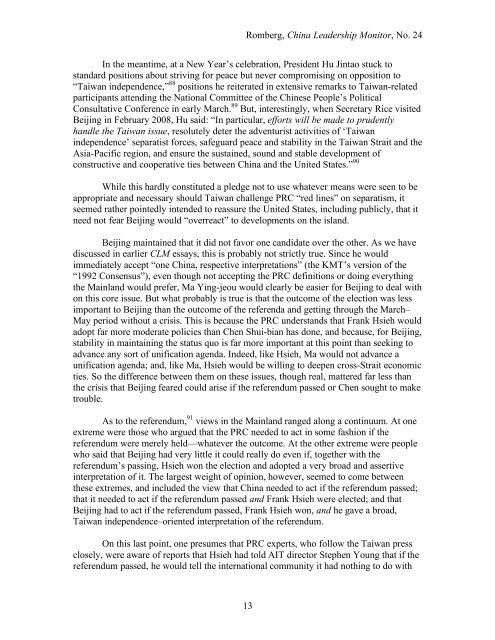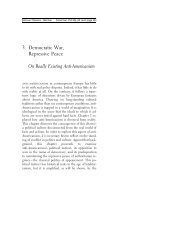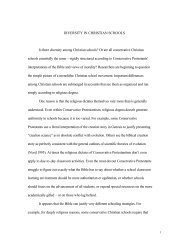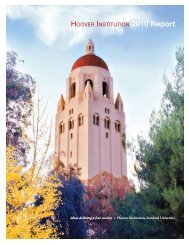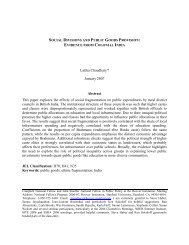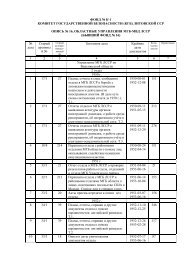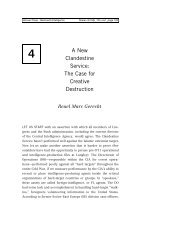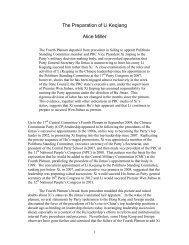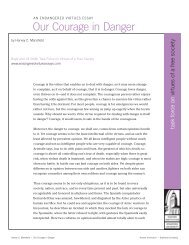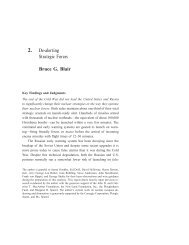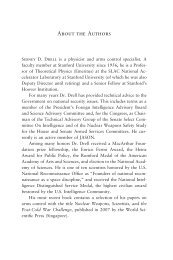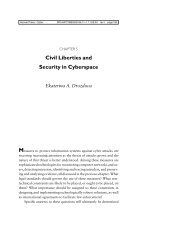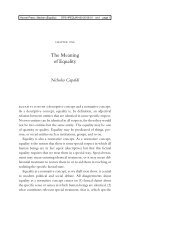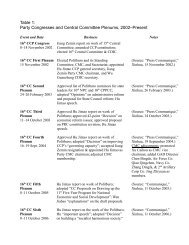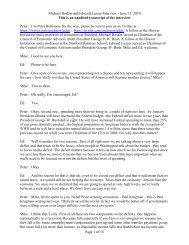Taiwan Elections: Foundation for the Future - Hoover Institution
Taiwan Elections: Foundation for the Future - Hoover Institution
Taiwan Elections: Foundation for the Future - Hoover Institution
Create successful ePaper yourself
Turn your PDF publications into a flip-book with our unique Google optimized e-Paper software.
Romberg, China Leadership Monitor, No. 24<br />
In <strong>the</strong> meantime, at a New Year’s celebration, President Hu Jintao stuck to<br />
standard positions about striving <strong>for</strong> peace but never compromising on opposition to<br />
“<strong>Taiwan</strong> independence,” 88 positions he reiterated in extensive remarks to <strong>Taiwan</strong>-related<br />
participants attending <strong>the</strong> National Committee of <strong>the</strong> Chinese People’s Political<br />
Consultative Conference in early March. 89 But, interestingly, when Secretary Rice visited<br />
Beijing in February 2008, Hu said: “In particular, ef<strong>for</strong>ts will be made to prudently<br />
handle <strong>the</strong> <strong>Taiwan</strong> issue, resolutely deter <strong>the</strong> adventurist activities of ‘<strong>Taiwan</strong><br />
independence’ separatist <strong>for</strong>ces, safeguard peace and stability in <strong>the</strong> <strong>Taiwan</strong> Strait and <strong>the</strong><br />
Asia-Pacific region, and ensure <strong>the</strong> sustained, sound and stable development of<br />
constructive and cooperative ties between China and <strong>the</strong> United States.” 90<br />
While this hardly constituted a pledge not to use whatever means were seen to be<br />
appropriate and necessary should <strong>Taiwan</strong> challenge PRC “red lines” on separatism, it<br />
seemed ra<strong>the</strong>r pointedly intended to reassure <strong>the</strong> United States, including publicly, that it<br />
need not fear Beijing would “overreact” to developments on <strong>the</strong> island.<br />
Beijing maintained that it did not favor one candidate over <strong>the</strong> o<strong>the</strong>r. As we have<br />
discussed in earlier CLM essays, this is probably not strictly true. Since he would<br />
immediately accept “one China, respective interpretations” (<strong>the</strong> KMT’s version of <strong>the</strong><br />
“1992 Consensus”), even though not accepting <strong>the</strong> PRC definitions or doing everything<br />
<strong>the</strong> Mainland would prefer, Ma Ying-jeou would clearly be easier <strong>for</strong> Beijing to deal with<br />
on this core issue. But what probably is true is that <strong>the</strong> outcome of <strong>the</strong> election was less<br />
important to Beijing than <strong>the</strong> outcome of <strong>the</strong> referenda and getting through <strong>the</strong> March–<br />
May period without a crisis. This is because <strong>the</strong> PRC understands that Frank Hsieh would<br />
adopt far more moderate policies than Chen Shui-bian has done, and because, <strong>for</strong> Beijing,<br />
stability in maintaining <strong>the</strong> status quo is far more important at this point than seeking to<br />
advance any sort of unification agenda. Indeed, like Hsieh, Ma would not advance a<br />
unification agenda; and, like Ma, Hsieh would be willing to deepen cross-Strait economic<br />
ties. So <strong>the</strong> difference between <strong>the</strong>m on <strong>the</strong>se issues, though real, mattered far less than<br />
<strong>the</strong> crisis that Beijing feared could arise if <strong>the</strong> referendum passed or Chen sought to make<br />
trouble.<br />
As to <strong>the</strong> referendum, 91 views in <strong>the</strong> Mainland ranged along a continuum. At one<br />
extreme were those who argued that <strong>the</strong> PRC needed to act in some fashion if <strong>the</strong><br />
referendum were merely held—whatever <strong>the</strong> outcome. At <strong>the</strong> o<strong>the</strong>r extreme were people<br />
who said that Beijing had very little it could really do even if, toge<strong>the</strong>r with <strong>the</strong><br />
referendum’s passing, Hsieh won <strong>the</strong> election and adopted a very broad and assertive<br />
interpretation of it. The largest weight of opinion, however, seemed to come between<br />
<strong>the</strong>se extremes, and included <strong>the</strong> view that China needed to act if <strong>the</strong> referendum passed;<br />
that it needed to act if <strong>the</strong> referendum passed and Frank Hsieh were elected; and that<br />
Beijing had to act if <strong>the</strong> referendum passed, Frank Hsieh won, and he gave a broad,<br />
<strong>Taiwan</strong> independence–oriented interpretation of <strong>the</strong> referendum.<br />
On this last point, one presumes that PRC experts, who follow <strong>the</strong> <strong>Taiwan</strong> press<br />
closely, were aware of reports that Hsieh had told AIT director Stephen Young that if <strong>the</strong><br />
referendum passed, he would tell <strong>the</strong> international community it had nothing to do with<br />
13


